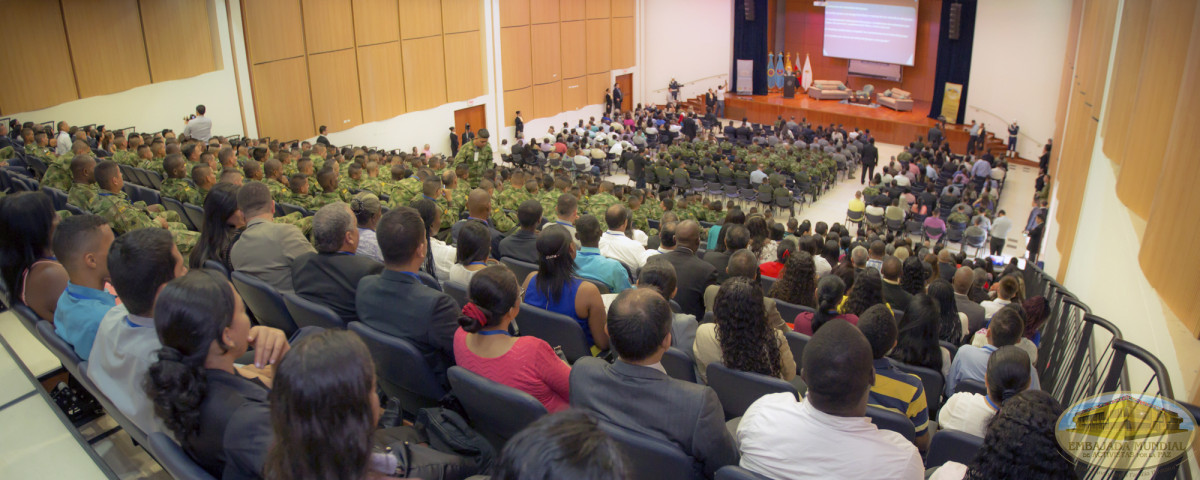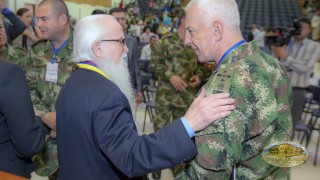The typification of ethnocide, a central topic of analysis in the National Judicial Forum developed in the Military School of Aviation "Marco Fidel Suárez" of Colombia
The acts of protocol initiated the National Judicial Forum “Human Dignity, Presumption of Innocence and Human Rights,” event held with the support of Joint Command No. 2 of the South West and the Military School of Aviation “Marco Fidel Suárez,” on August 1, 2016 in Cali, Colombia.
The acts of protocol initiated the National Judicial Forum “Human Dignity, Presumption of Innocence and Human Rights,” event held with the support of Joint Command No. 2 of the South West and the Military School of Aviation “Marco Fidel Suárez,” on August 1, 2016 in Cali, Colombia.
Around 600 people were present at this event that brought together the International Board of Directors of the GEAP, Dr. William Soto Santiago, Executive President; Gabriela Lara, General Director; Ivan Sarmiento, National Coordinator; Dr. Camilo Montoya Reyes, Magistrate of the Superior Council of the Judiciary; Dr. Jesús María Lucumi, Executive Director of AFROCOLOMBIA VIVA; Dr. Sigifredo López, Peace and Human Rights Advisor of the Government of Valle del Cauca; Dr. Oscar Mauricio Lizcano, President of the Congress of the Republic; Dr. Guillermina Bravo, representative to the Chamber for Valle del Cauca; Dr. Fabio Cardozo, High Advisor for Peace and Human Rights of the Government of Valle del Cauca; and members of military, judicial and civil authorities.
The opening words were addressed by Brigadier General Wilson Neyhid Chávez, Commander of the Third Brigade of the National Army, who reaffirmed the commitment of the military to respect and promote Human Rights in the southwestern part of the country; and Colonel Luis Enrique Orozco, deputy director of the Aviation School Marco Fidel Suárez, who indicated that these academic spaces contribute to forming good men, committed to making Colombia a more prosperous country.
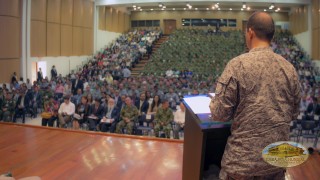
The objectives of the International Program “Justice for Peace” were given by Gabriela Lara, indicating that it aims to provide international justice with the necessary democratic tools to strengthen the efficiency, autonomy and effectiveness of the prevention and protection of human rights.
The typification of ethnocide a contribution to world peace
The panel of speeches began with the intervention of Dr. William Soto Santiago; his dissertation revolved around the need to study, analyze and implement actions aimed at achieving the criminalization of ethnocide in national legislations and international law, since, according to its legal consideration, the Convention for the Prevention and Punishment of the Crime of Genocide and the Rome Statute forgot to protect the human groups from cultural attacks.
In summary, the behaviors typified in the instruments of protection, considered partial or total physical destruction; and this way any intangible attack against the identity, religion or language of a community or group, would be outside of the typification, and therefore, excluded as passive subjects of the behavior.
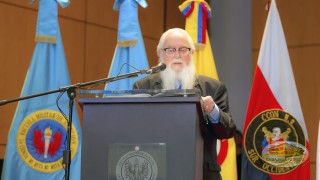
“The so-called ‘ethnic cleansing’ dismembers the group from its territory, and that behavior attacks against the existence of the group and against its identity. These serious attacks should be criminalized as an international crime, as a form of genocide. The Global Embassy of Activists for Peace works on typifying ethnocide in Latin America and other countries, with the development of the Program “Justice for Peace.”
Then, Dr. Camilo Montoya Reyes emphasized the characteristics that justice must bring together in a social State of law to serve as a foundation for peace.
“A judge in this XXI century, is an instrument of criminal policy, a judge in this XXI century creates right; it is no longer the judge who believed that he was the mouth of the law. This formalist interpretation of law is surpassed, to pay tribute to the constitutional legal principles.”
The representative participation of Afro-descendant groups of the country also took place in this forum; and to this extent, Dr. Jesús Lucumi gave with a historical tour of the Afro-Colombian communities in the origin and construction of Colombia.
“We are right now working here in Colombia to develop Dec. 1122 according to Law 70, which is where the Government orders that in all public and private establishments of the country must be instructed in the subject of ethno-education, to understand who we are at an ethnic and cultural level.”
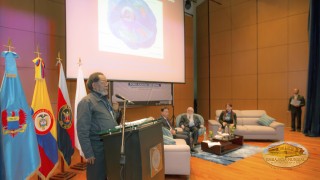
Congressmen, peace advisers and high human rights counseling, in a commitment of pedagogical and legislative work for the defense of ethnic and cultural groups.
The second part of the forum was developed in a panel of questions and answers led by Dr. Sigifredo López, who was the moderator.
It was mentioned that although political participation was implemented in 1991 for Afro and native communities in the country, it is to be recognized that the progress has not been sufficient; faced with this reality Dr. Sigifredo López questioned:
“What has the Colombian Congress thought about ethnocide prevention? Would we be willing to present a bill that would make it a special crime other than genocide?”
“We have committed ourselves to sit down with the National Council of Criminal Policy of the country, to study with them how this type of crime would be drafted, so that in all that comes from this process of peace, that crime is well penalized. We have all the will and decision to conform - if they have one - a working table with Dr. Guillermina and the Global Embassy of Activists for Peace, to review the presentation of this project. On behalf of the Senate we have every commitment to protect the rights of ethnic groups and their culture.” —Dr. Oscar Mauricio Lizcano.

“These Forums allow us to have clear knowledge about what affirmative actions should be done in favor of world peace and, clearly, of Colombia. It is important to take into account the differences, and be able to understand each other in the midst of them.” —Dra. Guillermina Bravo.
Faced with the issues and situations that the country will have to face, a pedagogy for peace is necessary, a commitment to work for peace
“The current peace process must promote in Colombia a complete revision of its structures, it will profoundly impact the national culture. This process will have to make a revision regarding the issue of representation in Colombia and, of course, the structure of the Colombian Justice.” —Dr. Fabio Cardozo Montealegre.
The National Judicial Forums are a space for discussion and enrichment of projects on which the Global Embassy of Activists for Peace has been working on with the subject of “Justice for Peace".
